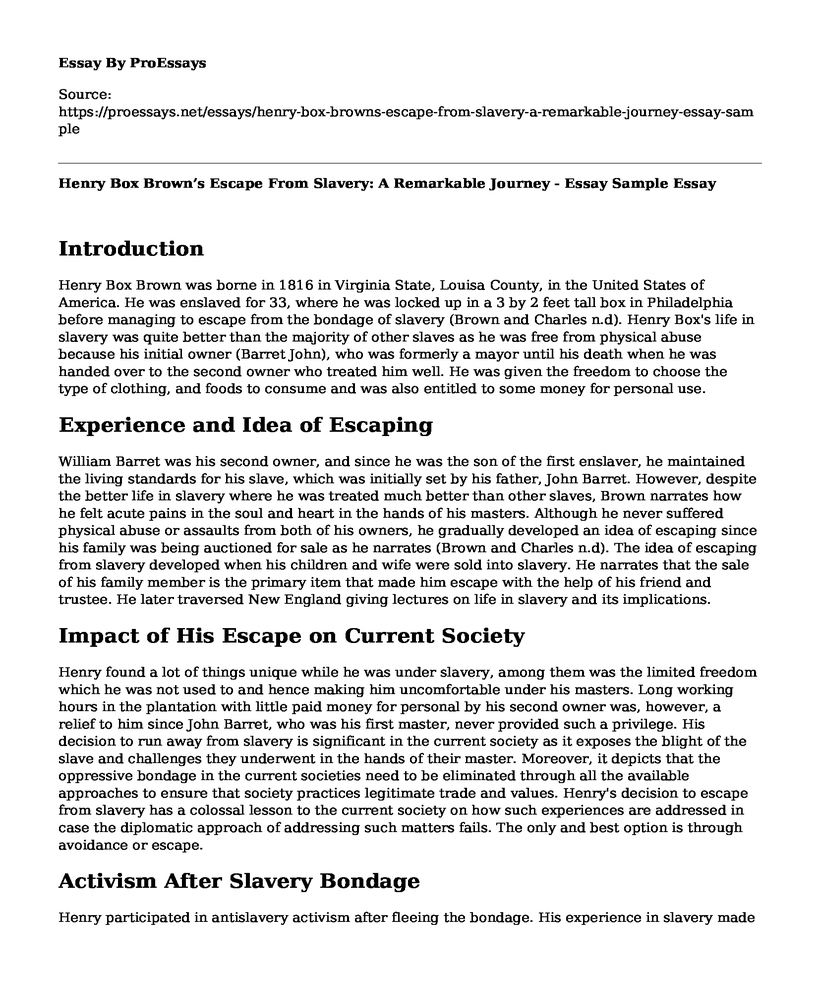Introduction
Henry Box Brown was borne in 1816 in Virginia State, Louisa County, in the United States of America. He was enslaved for 33, where he was locked up in a 3 by 2 feet tall box in Philadelphia before managing to escape from the bondage of slavery (Brown and Charles n.d). Henry Box's life in slavery was quite better than the majority of other slaves as he was free from physical abuse because his initial owner (Barret John), who was formerly a mayor until his death when he was handed over to the second owner who treated him well. He was given the freedom to choose the type of clothing, and foods to consume and was also entitled to some money for personal use.
Experience and Idea of Escaping
William Barret was his second owner, and since he was the son of the first enslaver, he maintained the living standards for his slave, which was initially set by his father, John Barret. However, despite the better life in slavery where he was treated much better than other slaves, Brown narrates how he felt acute pains in the soul and heart in the hands of his masters. Although he never suffered physical abuse or assaults from both of his owners, he gradually developed an idea of escaping since his family was being auctioned for sale as he narrates (Brown and Charles n.d). The idea of escaping from slavery developed when his children and wife were sold into slavery. He narrates that the sale of his family member is the primary item that made him escape with the help of his friend and trustee. He later traversed New England giving lectures on life in slavery and its implications.
Impact of His Escape on Current Society
Henry found a lot of things unique while he was under slavery, among them was the limited freedom which he was not used to and hence making him uncomfortable under his masters. Long working hours in the plantation with little paid money for personal by his second owner was, however, a relief to him since John Barret, who was his first master, never provided such a privilege. His decision to run away from slavery is significant in the current society as it exposes the blight of the slave and challenges they underwent in the hands of their master. Moreover, it depicts that the oppressive bondage in the current societies need to be eliminated through all the available approaches to ensure that society practices legitimate trade and values. Henry's decision to escape from slavery has a colossal lesson to the current society on how such experiences are addressed in case the diplomatic approach of addressing such matters fails. The only and best option is through avoidance or escape.
Activism After Slavery Bondage
Henry participated in antislavery activism after fleeing the bondage. His experience in slavery made him spread antislavery ideologies as an after slavery activism across New England immediately; he escaped from Philadelphia, where he was enslaved (Blassingame 490). Henry had various experiences in different destinations; he went with varying perceptions from the natives of the majority of the countries he went to lecture on the blight of the slaves. He later fled England upon enactment of the fugitive slaves' acts that targeted him in the country and later resumed his lecturing sessions in various countries with his new family when he later died in an unknown place, date, and the cause of his death remained unknown( Blassingame 491).
Conclusion
To sum up, live in slavery as exposed by Henry Box Brown entailed various challenges that the majority of them were against humanity. His decision and culmination to escape was a great move that ended the slave trade practice in a way through his activism after slavery. He engaged various parties while selling his antislavery ideologies and exposing the negative and other challenges faced by the slaves under the hands of their masters.Works Cited
Blassingame, John W. The slave community: plantation life in the antebellum South. New York: Oxford University Press, 1979. 487-493 DOI:10.2307/2701715
Brown, Henry Box, and Charles Stearns. Narrative of Henry Box Brown, Who Escaped from Slavery Enclosed in a Box 3 Feet Long and 2 Wide. No. 205. Historical Publications, 1849.
Cite this page
Henry Box Brown's Escape From Slavery: A Remarkable Journey - Essay Sample. (2023, Apr 24). Retrieved from https://proessays.net/essays/henry-box-browns-escape-from-slavery-a-remarkable-journey-essay-sample
If you are the original author of this essay and no longer wish to have it published on the ProEssays website, please click below to request its removal:
- Paper Example on Scientific and Industrial Revolution
- Tri-Colonial Development: Mercantilism & Indenture Servitude - Essay Sample
- Essay Example on Tata Steel: A Visionary's Journey of Nationalism & Industrial Revolution
- Essay on U.S. Joins WW2 After Shock of Pearl Harbor Attack: The Guardian Report (1941)
- American Civil War: Abraham Lincoln vs Jefferson Davis - Essay Sample
- Essay Example on Mary Eliza: A Trailblazing Black Professional Nurse
- Annie Oakley: West America - Movie Review Sample







